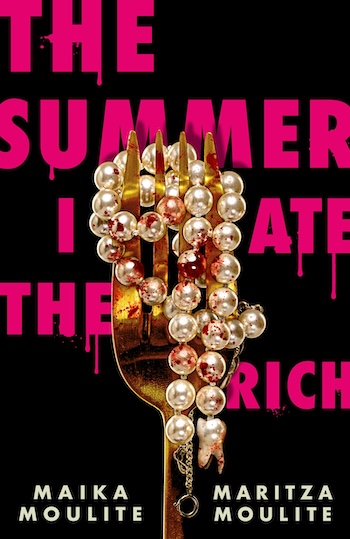YA Book Review: “The Summer I Ate the Rich” — A Limited Menu
By Sarah Osman
Despite its title, this YA novel would be best described as an exercise in magic realist satire. Those looking for heaping helpings of the affluent will be disappointed.
The Summer I Ate the Rich by Maika and Maritza Moulite. Farrar, Straus and Giroux, 400 pages, $19.99
 The phrase “eat the rich” first became a “revolutionary” motto when Pierre Gaspard Chaumette chanted it during the French Revolution: “When the people shall have nothing more to eat, they will eat the rich.” Chaumette didn’t literally mean eat the rich. But when I read the synopsis for Maika and Maritza Moulite’s YA novel, The Summer I Ate the Rich, I assumed that in this narrative that might be the case: the protagonist would literally be eating the rich. After all, we are told that she is a zombie. Sadly, our heroine only devours them metaphorically.
The phrase “eat the rich” first became a “revolutionary” motto when Pierre Gaspard Chaumette chanted it during the French Revolution: “When the people shall have nothing more to eat, they will eat the rich.” Chaumette didn’t literally mean eat the rich. But when I read the synopsis for Maika and Maritza Moulite’s YA novel, The Summer I Ate the Rich, I assumed that in this narrative that might be the case: the protagonist would literally be eating the rich. After all, we are told that she is a zombie. Sadly, our heroine only devours them metaphorically.
The novel follows Brielle Petitfour, the daughter of a Haitian immigrant, who has strived her whole life to be perfect. Her mother is chronically sick, and her health insurance refuses to pay for the medicine she needs. Brielle is a genius in the kitchen and dreams of being a chef, but for some reason that is not a viable career (at least according to her mother). After Brielle is given the old phone of her mother’s wealthy boss’s son, she decides to do some good deeds and donate money on his behalf. As punishment — or a possible thank you for bringing the billionaire some good PR — Brielle is hired to work for his company. Thanks to her newfound connections, Brielle starts hosting successful supper clubs whose cuisine contains a special ingredient — human flesh. Oh, and she happens to be part zonbi. Note that’s zonbi in the traditional Haitian sense — not a Western type zombie.
Brielle is funny, savvy, and endearing. She doesn’t fall into stereotypical immigrant tropes or care only about her love life. It is her narrative voice that kept me reading — I was continually entertained by her snarky asides and antics. She never lets the rich snobs get the best of her, calmly handling the arrogant hissy fits thrown by her Devil Wears Prada-esque boss and her minions. In addition to Brielle’s perspective, the strongest part of the novel is her relationship with her mother. There is an autobiographical source for this: Brielle’s experience is pulled from the real life of the Moulite sisters, including having to deal with a chronically ill mother. The mother in the novel isn’t just another immigrant parent; she’s strict, but she loves to playfully banter with her daughter and expresses her appreciation for everything Brielle does for her. When her “mummy” (as Brielle calls her) criticizes her daughter, it is often for good reason. Brielle does make some questionable decisions throughout the novel, such as traveling internationally with a semi-boyfriend.
Unfortunately, even Brielle’s voice is not strong enough to sustain the storyline. The Summer I Ate the Rich begins to falter when it shifts from Brielle to her sisters back in Haiti. Framed as manifestations of the Greek muses, the Petitfour sisters are used to bring in a backstory that involves Brielle’s father and why her mother left Haiti in the first place. Designed as a conversation/screenplay between the sisters, these scenes left me confused. It was unclear why Greek mythology was brought in, especially given that the story is so rooted in Haitian culture and folklore. Structural shifts in a novel can be exciting because they scramble up clichés, but the strategy felt out of place here. For the most part, the Moulite sisters make traditional moves. By the end of the book, I still wasn’t 100 percent clear on the Greek myth/ zonbi sections — even after researching Haitian zonbis. Also, these sections don’t add much to the spine of the story, which has its own mysteries. How was Brielle able to control the wealthy, make them do her will? It is hinted that the spell was cast by the human flesh in her cooking. Why couldn’t it be because Brielle is such a great chef?
Also, YA horror mavens be warned: the scariest aspect of The Summer I Ate the Rich is the sheer amount of money the wealthy blow on stupid stuff. This would be best described as an exercise in magic realist satire. Those expecting heaping helpings of the affluent will be disappointed.
Sarah Mina Osman is based in Los Angeles. In addition to the Arts Fuse, her writing can be found in Huffington Post, Success Magazine, Matador Network, HelloGiggles, Business Insider, and WatchMojo. She has an MFA in Creative Writing from the University of North Carolina Wilmington and is working on her first novel. She has a deep appreciation for sloths and tacos. You can keep up with her on Instagram @SarahMinaOsman and at Bluesky @sarahminaosman.bsky.social.
Tagged: "The Summer I Ate the Rich", Maika Moulite, Maritza Moulite
